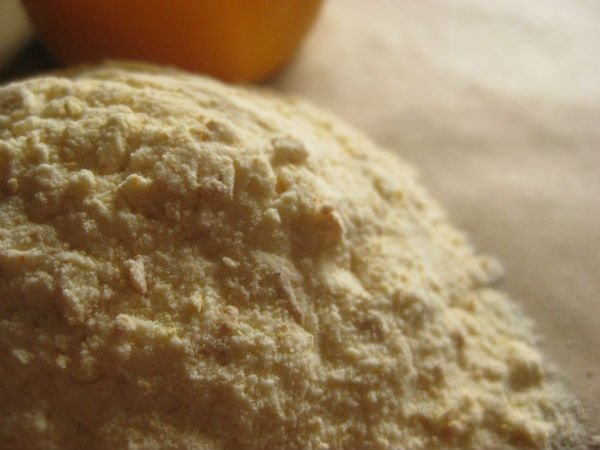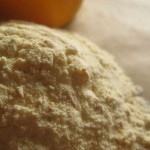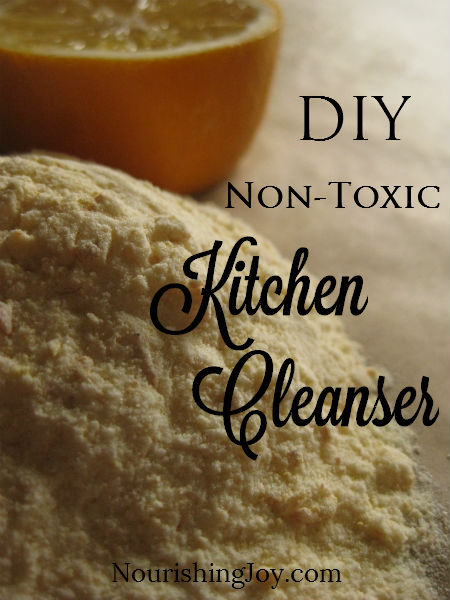DIY Non-Toxic Kitchen Cleanser
This post may contain affiliate links, including those from Amazon.com, which means we earn a small commission off your purchases. And here's the thing: We only mention services and products that we think are truly worth your attention, whether they're free, paid, or otherwise. This site relies on YOUR trust, so if we don't stand behind a product 110%, it's not mentioned. Period.
When I'm done cleaning my kitchen, I want it to smell clean.
And I don't mean, I don't merely want it not to smell dirty. No, I want it to smell CLEAN.
Fresh. Enlightening. Invigorating!
That's why, as I've been making and experimenting with DIY homemade cleaners over the last few years, I wanted to get this recipe just right. Obviously, it needed to be effective to deal with all the spills and residues that can build up in a kitchen, but it was also really really important to me for it to smell so good that I wouldn't want to stop cleaning and when I was done, I'd want to stay in the kitchen to have a cup of tea.
That's why I was so excited when the idea to use dehydrated citrus peels came across my radar. I had been using leftover half-lemons and oranges for scrubbing, which was somewhat effective and they did smell good, but they were messier than I liked – I certainly couldn't store them long-term.
So when this recipe worked, I was in hog heaven! (It's so simple I even hesitate to call it a recipe….) Just grind everything together and away you go!
May this cleanser serve your kitchen as well as mine.
DIY Non-Toxic Kitchen Cleanser
Ingredients
- 1 cup baking soda
- 4 peels from fresh oranges
- ¼ cup borax, optional
- 20 drops lemon, orange, or grapefruit essential oil, optional
Instructions
- First, dry the peels, either by tearing them into dime-sized pieces and letting them sit for 3-4 days OR by placing them in a food dehydrator at 100ºF for 6-8 hours (time will vary widely depending on the thickness of the peel and the size of the pieces).
- When the peels are fully dry, place them in a spice grinder or blender and pulverize them into a fine powder. (Alternatively, you could zest the fresh peels, dehydrate the zest, then skip this step, but the final result will be a bit coarser.)
- Mix the citrus peel powder with the remaining ingredients in a large bowl. Place in a shaker container or small Mason jar and use on sinks, counters, and stovetops. Store in a dry place.
Notes
DIY Non-Toxic Kitchen Cleanser
Ingredients
- 1 cup baking soda
- ½ cup powdered citrus peels, from 2-4 fresh fruit
- ¼ cup borax, optional
- 20 drops lemon, orange, or grapefruit essential oil (optional)
Instructions
- First, dry the peels, either by tearing them into dime-sized pieces and letting them sit for 3-4 days OR by placing them in a food dehydrator at 100ºF for 6-8 hours (time will vary widely depending on the thickness of the peel and the size of the pieces).
- When the peels are fully dry, place them in a spice grinder or blender and pulverize them into a fine powder. (Alternatively, you could zest the fresh peels, dehydrate the zest, then skip this step.)
- Mix the citrus peel powder with the remaining ingredients in a large bowl. Place in a shaker container or small Mason jar and use on sinks, counters, stovetops, and even (non-wood) floors. Store in a dry place.
Notes
- If you're not crazy about using borax, feel free to leave it out. It's merely here as a brightener.







I love this idea. I’m trying to convert my home into a truly all natural home. I’m wondering how much of a germ killer out is. If I spill chicken juice or blood from meat, or egg yolks in my kitchen is this what I should use to clean it? Is it that effective against those germs? Thanks. I appreciate your responses.
This isn’t a germ killer at all – it’s just for scrubbing. In the case of bacteria and viruses, I would use our homemade bleach – https://nourishingjoy.com/homemade-bleach/. 🙂
Have fun cleaning!
Hi Kresha,
love this post!
Have you got a cleaner that would work on the glass door of my woodburner stove?
It gets really black quickly.
Thank you
If you’re looking to clean the OUTSIDE of the woodburner door, this cleanser would work well, which you could add a bit of vodka to if you need more of a paste glass cleaner or a tablespoon or so of very fine sand, powdered egg shells, or pulverized walnut shells if you need a bit of gentle grit. Otherwise, there’s a recipe for basic glass cleaner in the ebook I reference above, Clean, Naturally! http://www.njbeta.wpengine.com/my-books/
If you’re looking to clean the INSIDE of the door, how often do you burn out creosote? That should disintegrate any residues, which you can just wipe away once the stove is cool, but I would imagine that’s not what you’re asking. Am I understanding correctly?
Thanks for the reply Kresha,
it’s the inside of the door, it gets completely black and very sticky, we burn mostly pine
Thanks for your reply
Hmmm…. well, then, this would work, but I’d recommend a larger course of action. Let’s see…. often with really sticky stuff, like pine sap and tar, I cool it as much as possible (like rubbing it with an ice cube) and scrape off as much as I can. With what’s remaining, I find that an oil works better than water to bind with it and “unstick” it, so olive oil, coconut oil, butter, that sort of thing. Just rub it on with a cloth and with a bit of rubbing, usually the sticky stuff will come off as you rub. Orange oil is fabulous in this application too, and this baking soda scrub would work well at this stage. Then, once it’s pretty much off, use soap and water to remove any oil residue. As a final stage (but likely unnecessary step), you could use a glass cleaner or pure alcohol to do a final wipe, but since it’s a woodstove, I don’t know how long that shine would last. 😉
Experiment with what works best for your particular stove and let me know how it goes! It’s been a while since I had a woodstove to clean (can’t wait until we have one again), so I’m trying to remember what I did for the ones with glass doors!
do we use this like comet? or mix it with water in a spray bottle.
Use this like Comet – it’s just a good scrub. And if you need a bit of extra abrasive, you can use the secret ingredient we use in our bathtub scrub. 🙂
https://nourishingjoy.com/homemade-bathtub-scrub-with-a-surprising-secret-ingredient/
Borax is toxic! Do NOT use it!